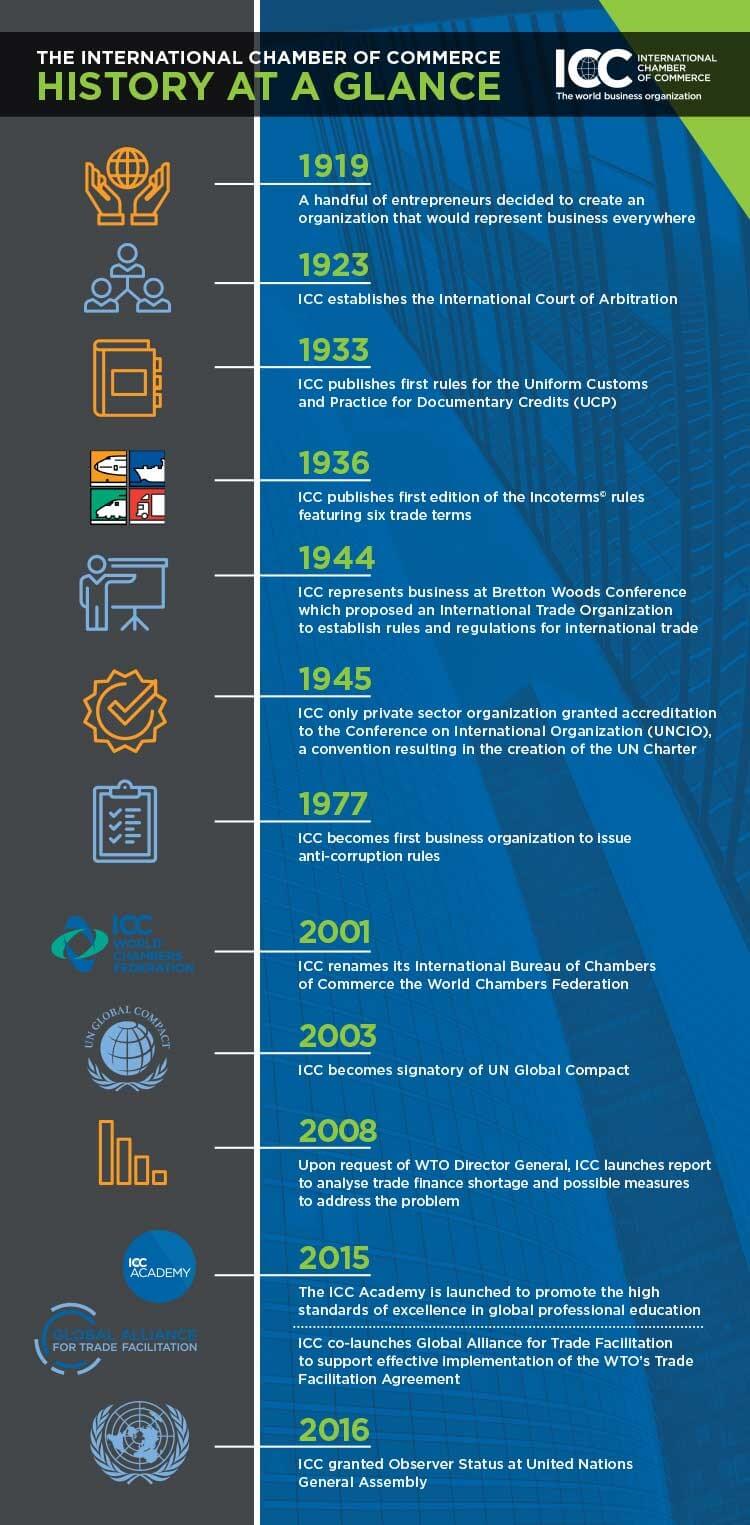In simple words, Institutional Arbitration is a type of arbitration where parties to the dispute submit their issue or matter to an Institution specifically designated for the process of administering arbitration between the parties.
Some of the Arbitration Organizations/ Institutions are:
- International Chamber of Commerce
- Indian Council of Arbitration
- World Intellectual Property Organization
- London Court of International Arbitration
- The International Centre for Alternative Dispute Resolution
Institutional Arbitration and the ICC Rules
International Chamber of Commerce (ICC) was established in 1919, in the aftermath of the World War I, when there were no set of rules around the world that governed trade, finance, investment or commercial relations. ICC’s founders without waiting for the world governments to fill the gap, acted on their principles that the private sector is competent enough to set global standards for businesses.

Source : https://iccwbo.org/about-us/who-we-are/history/
INTERNATIONAL COURT OF ARBITRATION
The International Court of Arbitration (ICA), established in 1923, is the world’s leading arbitral institution and has been aiding in resolving difficulties in international commercial and business disputes to support investment and trade. Although it has court in its name, but it do not pronounce any formal judgments on disputed matters. However, it exercises judicial supervision of arbitration proceedings relating to disputes between the parties. Their key responsibilities include:
- Confirming, appointing and replacing arbitrators, as well as deciding on any challenges made against them.
- Monitoring the arbitral process to make certain that it is performed properly and with the required speed and efficiency necessary.
- Scrutinising and approving all arbitral awards to reinforce quality and enforceability.
- Setting, managing and if necessary adjusting fees and advances.
- Overseeing emergency proceedings before the start of the arbitration
The main objective is to ensure proper implementation of the ICC Rules while assisting parties and arbitrators in overcoming procedural hindrances. The Court’s official working languages are English and French however, it can also administer cases in any language while communicating in all major languages including German, Russian, Arabic, Chinese, Portuguese, Italian, and Spanish.
ICC RULES OF ARBITRATION
The Arbitration Rules are those of 2012, as amended in 2017 and effective form March 01, 2017. The set Rules are used all around the world to resolve disputes and assure parties of a neutral framework for the resolution of cross-border disputes. The most noteworthy of the 2017 amendments is the introduction of an expedited arbitration procedure designed to provide a cost-efficient and fast method of dealing with low, or lower, value claims. The procedure will apply automatically to claims with a value of up to USD 2,000,000 arising out of arbitration agreements concluded after February 28, 2017, unless the parties agree to withdraw, or the ICC Court believes the procedure to be inappropriate. The expedited arbitration procedures can also apply to disputes between the parties’ worth over USD 2,000,000 if the parties agree to take part in the same.
Amendment of ICC Rules
The ICC Rules of Arbitration were recently amended on January 01, 2021 to define and regulate the management of cases having various disputes received by the International Court of Arbitration. The Appendix II of the Rules state Internal Rules of International Court of Arbitration describing the confidential character of the work, participation of members, relations between the members, constitution, quorum, decision making and various other aspects involved in functioning of International Court of Arbitration.
Features of the procedure under ICC Rules are as follows:
- The dispute is referred to a sole arbitrator even if the arbitration agreement provides otherwise.
- There is no requirement for terms of reference.
- Parties can only make new claims after the constitution of the arbitral tribunal with the permission of the tribunal.
- The case management conference shall take place no later than 15 days after the transmission of the file to the tribunal.
- The arbitral tribunal may refuse requests for the production of documents, limit the number and length of witness statements and expert reports and decide the dispute on papers only, without an oral hearing.
- The tribunal must render its award within 6 months of the case management conference.
- A reduced scale for arbitrator’s fees applies.
- Key deadlines can be extended, but the intention is to drastically reduce or do away with the typical use of disclosure, witness evidence and hearings.
- Terms of reference: The arbitral tribunal now has 30 days (reduced from two months) in which to sign and return the Terms of Reference to the Court.
- Arbitration costs: A Request for Arbitration now requires a filing fee of USD 5,000 (increased from USD 3,000).
- Administrative expenses: The Rules introduce revised fee scales for administrative expenses, although the ICC has avoided radical change.
Key points to remember
- A new compulsory six-month arbitration procedure to apply to disputes with a value below USD 2,000,000 arising from contracts concluded after 28 February 2017.
- Some ICC Court decisions may be published to the parties.
ICC RULES OF MEDIATION
In 2014, the Rules came in force to reflect modern practice of law and set clear parameters for the conduct of arbitration proceedings. The Rules recognized and maintained the need for flexibility and like the ADR Rules, they can be used for conducting other procedures for coming at an amicable settlement between the parties.
CONCLUSION
Parties to a dispute wanting to have recourse to ICC arbitration, mediation, or both, are motivated to include an suitable dispute resolution clause in their agreements. For this purpose, all the Rules are followed by model clauses along with instructions on their use and how they may be amended for specific needs and circumstances. The model clauses comprise of multi-level clauses providing for a combination of procedures as well as clauses contemplating a single procedure.
Both the Rules and the model clauses are available for use by parties, whether or not members of the ICC and the same have been translated into several languages, available at the ICC website.
Related Posts
Online Arbitration Practices in India
ARBITRATION CLAUSES IN GOVERNMENT CONTRACTS


